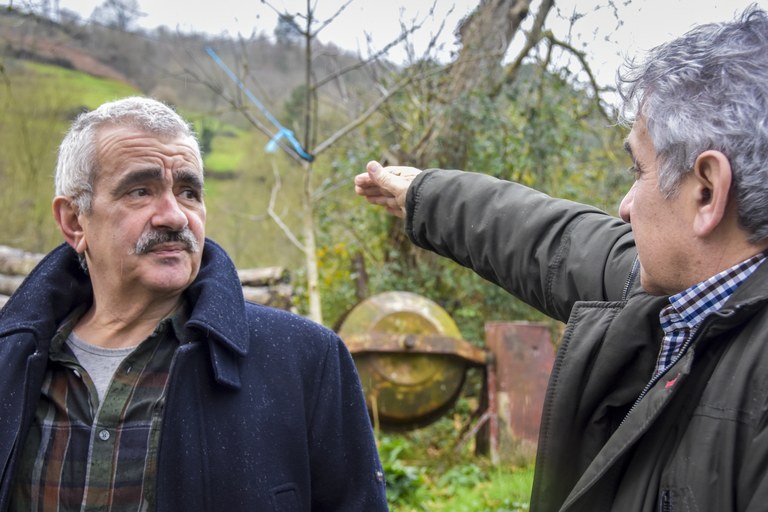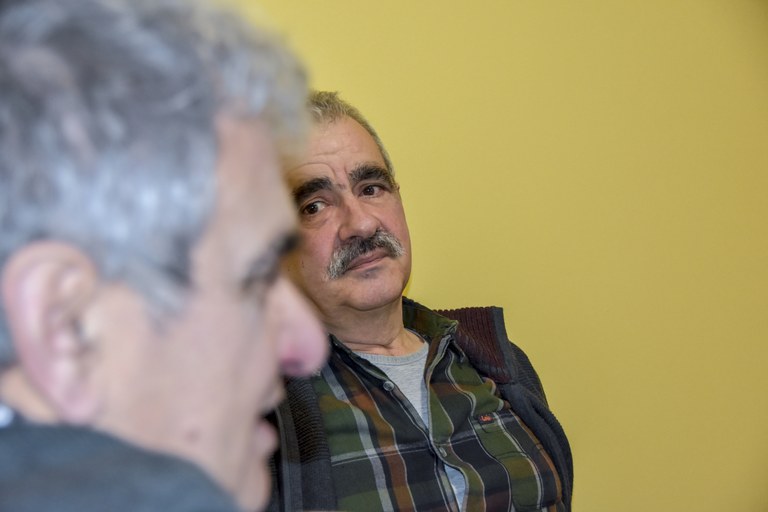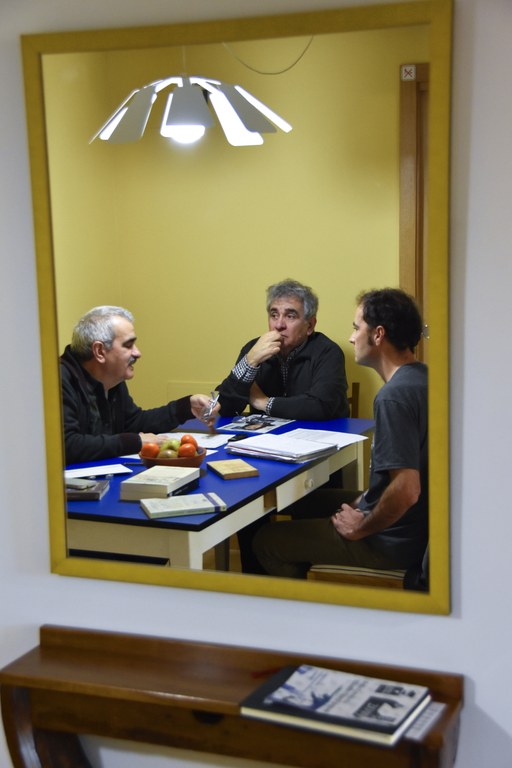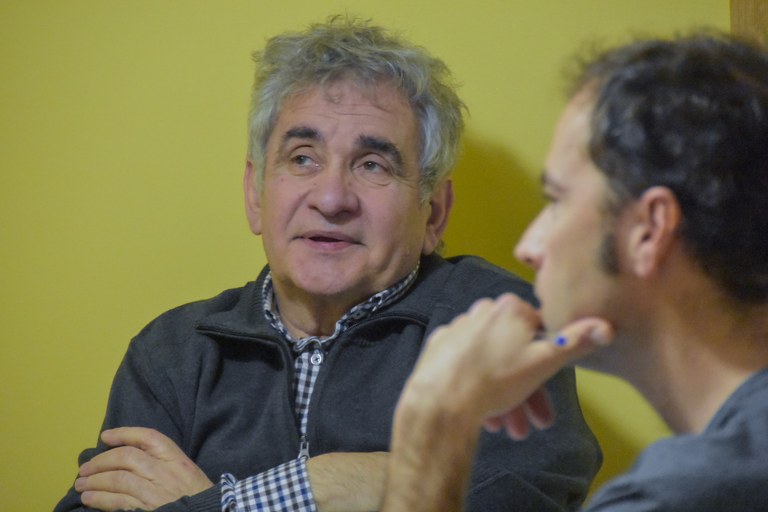
This ![]() news has been published by the journal Alda and we have brought it with the Creative Commons license.
news has been published by the journal Alda and we have brought it with the Creative Commons license.
With this pretext - the passion and the fondness for writing - we have brought together two brothers, in Asteasu, in that Atxaga's oneiric Obaba. We were opened up to the Irazu house, and we started a two-hour conversation on a rainy morning, in a possible Obaba, but with two real brothers. After all, they are two brothers of Obaba.
We're in your childhood home. There are four years of difference between you (Bernardo is four years older), but many memories will be shared...
Bernardo: Yes, they're childhood memories before. We went to live in Andoain when I was a teenager, and I spent my youth in Bilbao, then in Vitoria and elsewhere. It's important to analyze how memory changes. What happens to us in childhood is stuck, and that is why we remember better what happened then, and the things of that age cannot be forgotten. It's not just a matter of time, it's a matter of relationship to space.
At the age of fourteen, to go to class, I had to go from Asteasu to Villabona by bike, from Villabona to Donostia by train, once they reached La Salle… To be in class at 9 a.m. I had to leave the town two hours before…
Ramón: When we went to Andoain -- I was 8 -- it was a kind of truce of childhood for me. The atmosphere of Andoain and especially that of Lasall became absolutely strange to me. However, at that time it was not normal to learn from the age of 14... We had that luck. Here in the village, it was very difficult for the people of the villages to send their children abroad to study. It was a fortune at the time.
B: It's true, but in our house, they gave a lot of importance to the studies. My mother was a teacher, yes, but my father was a carpenter, and he was also very clear that we had to learn. In addition, the parents made a huge effort.

Today we are in your childhood home, in your people. Has this area changed a lot?
B: We are profoundly inclined to use generalities. We say “Gipuzkoa, Euskal Herria”, etc. But that's a long way from the map of reality. For example, for me, going from Asteasu to Andoain was the biggest change in my life, although I was 5 kilometers away. Here politics was nothing, nobody talked about it.
Instead, in Andoain, in the 1970s, there were 19 clandestine teams. They told me when I arrived. And among them, three Troskist groups! And just one of these Troskist groups in Andoain… and in Zaragoza! It was rooted.
What I mean is that these different realities, in general, were in Gipuzkoa. But they were terribly different realities. Life and traffic maps are different.
A: I knew the anti-francoist movement of Josetxo (Bernardo), especially when he went to Bilbao to study at university. I was about 14 years old, I lived in Andoain then, and my brother brought us news of that mobile policy…
B: On the other hand, intergenerational bleeding was very large. I'm going to tell you an anecdote to clarify it. Prior to the legalization of the ikurrina, Ramon carried an ikurrina in a demonstration that took place in the Gipuzkoan locality of Andoain. The mother and grandmother looked out the window and the mother said: “Look, look, there goes Ramon with our flag.” Grandma said, “What is our flag? Is that?” (laughing...).
Commitment to literature, when and how does it emerge?
B: Commitment to literature is not something that happens at the beginning. The first thing is reading, then writing… But that's hobbies. And what really matters is how that hobby of reading emerges. Without that there is no commitment to literature, of course there is nothing.
In my case, thanks to a child who came to live from San Sebastian, I had access to many teapots, because I had an amazing collection. And we went to his house to stumble beams. If that guy hadn't lived in Asteasu, where would we be today? The anecdote is longer. 40 years later, my editor told me, coincidentally, that he was working very well in the editorial Plaza y Janes, and that he was from my village, specifically Asteasu. And that boy!
That and having at hand Andoain's public library pushed me to read. So for me, reading and writing were and are hobbies. Then, circumstances and other intimate circumstances led me to be a writer. But without reading, there's nothing else.
A: In my memory, I combine the politicization and the militancy against Franco, on the one hand, and the hobby of reading, on the other. One year, I went from high school to vocational training, to Don Bosco de Errenteria, and I was given many subjects. That gave me plenty of free time, and from my brother's hand, I received the hobby and the readiness. I started with his recommendation with writers from the United States: Raymond Carver, Dasshiell Hammett, Ross Macdonald, etc…
How did literature and politics combine?
A: At that time, in 1970, the Burgos process took place, and that can be my first political memory, directly. On a Saturday, in the streets of Errenteria, I had a tremendous mess... and in the meantime I was submerged in black literature.
B: I remember very well the Burgos process. It was the first manifestation of my life. Bilbao. The students went from Sarriko to Deusto, there were incidents and I got a bitch in an ear. Then, to build a heroic story, and because I'm a little bit deaf by this ear, I thought it should be the effect of that baton strike. But when I went to the doctor, I was denied that hypothesis… Despite this anecdote, the most important thing is the terrible politicization that occurred then.
A: As soon as I started college, when I was 18, I had to spend time in jail (three months), in 1973-74, for distributing political propaganda to me.
B: Once we went to visit Ramón, he said: ‘Hey, someone who walks around, writes in Basque better than you’… And it was Koldo Izagirre.
A: The arrests at the time were very frequent and easy. Once, with one of us, all the people around us fell, indeed it dominated. Next to Koldo Izagirre, our brother Iñaki was in a group of Basque students, and when he was arrested, he was arrested alongside another member of my group. That's how the rope of the arrests stretched. When I was in Martutete, my brother ran through the books: The human condition (André Malraux), Alice in Wonderland (Lewis Carroll) and Portrait of the Teenage Artist and Ulises (James Joyce). These books gathered Koldo's attention and curiosity. Until then I didn't know him.
B: On the road to being a writer, the most important thing is to see your writings published. Imagine that among the four fronts that ETA had at the time, there was also a culture. Later, that front created the magazine ‘Hitz’ (I think that was the name), and I collaborated on it. Of course, Txema Larrea was close. A curiosity: In 1974, I also asked Xabier Lete for an article for that Word… and he told me yes! This is the daring, the daring, the thinking.

Can the relationship between literature and politics be fruitful? Or will it always become a bondage relationship?
B: After all, everything is political, but to say that does not describe anything. I think there's a big difference between politics and the role of a writer. The politician always tends towards generality: he wants to count on the people, the working class, society. Literature, on the contrary, looks for details, concrete things, details. It's the universe of nuances. If I, as a writer, start from a generality (for example, from the situation of the working class) to write a book, I will not get anywhere, for sure.
In literature, we have to take the right path in the opposite direction. So, you can take a worker's life, from those nuances, and come to tell something universal. Of course, it's not easy.
In this world, where is trade unionism left?
A: There are coincidences between what I think is syndicalist and literary. For example, the two must be autonomous. Neither of them can be subject to other political interests: they have to maintain the autonomy to say and do whatever they want. And in line with what Bernardo says, trade unionism, like literature, has to start from the details, from what happens in a company and from how people are. Reality is the essential raw material.
B: That doesn't mean we have to be isolated. There it is, and we all know it, the aristocratic model of being a writer who looks at the world from a watchtower. The opposite model is called ‘democratic’. The author of this model tries to be close to people, not only when writing, but also through conferences, conversations, etc. I have said many times that on some issues I have confidence in the ELA trade union, but that does not mean that I work for a particular organization or under its dependence. When it comes to creating, when it comes to writing, we must act with complete autonomy. Creation work is individual.

Is literature useful for trade unionism?
A: I've been very lucky with my older brother. It is to him that I owe, to a large extent, the eagerness to read. Since my time at school, I have had the opportunity to follow closely the books I left, the reading tips, their writings. That hobby has helped me a great deal personally, and I believe that it can be effective in the political and trade union formation of the militants. Literature also provides us with a valuable knowledge of reality.
Have you been near Bernardo's books, perhaps even inside?
R (laughing): I've ever identified someone reading Bernardo's books. But a whole character copied from reality, no. It is true that the writers are very stupid (laughing, also Bernardo) and that they hide very well characters, experiences or whatever, inherited from their environment.
B: Well, some people think writing is like Thermomix: you put some elements in the machine and from there comes a novel or a poem. Well, no. Even the most stupid writer has a thousand elements in his head. This, the stupidest, imagine others. However, no one chooses the component that will be involved. Perhaps a five-second event or thought is enough to start a story. To explain it better: the writer is two different people.
And how do they differ?
B: One writes and the other walks, imagines, reads… And the machine that chooses the elements or components goes on its own. I think it's very much related to the unconscious. After all, a writer does not control what he writes and writes from a time-consuming point. Yes, as soon as I start writing something, the first line marks how to follow. A code is created between writers and readers. If you leave the code, you will pay...
In Erlea magazine, directed by Bernardo, there were two articles written by Ramón, and so we discovered Ramón’s writer…
A: I have never been very skilled in writing, but by necessity, I have written some for union responsibilities. But always in the same format, that is, texts related to union action: to correct assemblies, to make courses or reports... But in the case of Erlea magazine it was different, he had to write a story of a terrible event in Andoain, there was a fire in a building occupied by several people and two people died. The building was an industrial pavilion long abandoned and did not necessarily meet the minimum requirements to be able to reside in it.
When such a thing happens, the first thing we imagine is that the situation of marginal people is deplorable. But right away, we learned that most of the homeless people who lived there were ordinary workers, working as a precarious worker, as a cleaner, as well as a scrap yard or the like.
I did not feel at all that in our country there were workers living in such a situation.
What was the incentive to write?
A: The reactions that took place in the following days (including the mayor) mostly startled me.
From the City Hall they said that they did not lack a roof, that the social services knew their situation and added that to round it everything had been left homeless after the fire, since before they had protection from a roof...
Then I told my brother that in that event there was a story and he returned the ball to me. Why don't you write yourself? For me, it was a very difficult and laborious job, because I had no experience in similar works.
B: In that text by Ramón, as in all the texts, the edition of Asun Garikano was of great help. All texts are imperfect and never become perfect. Paul Valery said that “texts are not finished, they are abandoned,” and the truth is round. They may be different criteria for being editors or writers, but when we did Erlea magazine, we didn't want to make a publication for the literary aristocracy. We had another trend, and we asked for collaborations with the mountaineers, the trade unionists, the workers -- about what happens every day and in many places. It's the other concept in literature. Democratic, in other words.
A: Yes, it was true. I also collaborated with the bee on the workers of a subcontractor who worked in the cleaning of Sidenor in Azkoitia. Most were immigrants, especially Senegalese…
Erlea was Euskaltzaindia's magazine, and you, Bernardo, pulled out 12 issues as director. On the front page, did you present it as “the 1,700 magazine,” perhaps the number of potential readers?
B: That number 1,700 was very positive... Some people have told me it was very pessimistic, but well, the economy has already learned it and I know what I'm doing about numbers. I will tell you that we are about 500 people who usually buy books in Euskera, about 500 in the whole of Euskal Herria; hence, up to 1,700, there is room for optimism... That’s right, although many don’t want to see them. A newspaper like a bee needs time to read, energy, desire, etc. I am not a priest to advise others what suits them. On the contrary, I come from a Marxist philosophy. I therefore do not wish to point out any guilty parties. But please, there is no rhetoric. The situation is as it is: 500 buyers.

And where can the bottom of this problem be?
B: I repeat what he said on a radio show. Those programs were made in the program of Maite Artola of the Basque Country Irratia, under the name of Zeruko kronikak. I was counting on what I had seen during my travels to the sky. Well, in one of them I met Luis Villasante, because, of course, Father Villasante went directly to heaven and there he is. He showed me a place that looked like a baggage station at large airports, visible from the sky, but belonging to the Purgatory. Thousands of suitcases fluttered through the conveyor belts. “What’s in those bags?” I asked. He said to me, “There are beautiful things about Basque culture, but at the same time nobody wants them and they are there all the time.”
That is what happens to Basque culture. There's a lot of suitcases, a lot of treasures in those suitcases, but nobody's going to look for them. The Euskaldunes say they want culture in Euskera, and they go on an excursion to the festivities and festivities in favor of the Basque country. But then, when it comes time to get to know the results of that culture, a poem, a novel, an essay, a newspaper article, ay! They are not in their opinion. Look at how the citizens who appear on television shows speak. It is clear that they have not read a page in their lifetime and are in dire straits every time they have to give an explanation of more than 20 seconds. Many Euskaldunberris, on the contrary. The accent will not be so noble, but they can often talk about anything.
And the solution?
B: In short, our problem is not in production, but in distribution, in dissemination. An effort should be made to put the Basque culture before the people, such as the soup plate at the table. Otherwise, it will keep rolling through these conveyor belts for eternity. And the people of the sky, yes, can be expected in all eternity. We don't.
A: We must not forget the importance of translations, not only in literature, but in all sections, starting with trade unionism. Of course, we must give priority to the creation of writings in Basque. But when that is not possible, good translation is essential. All materials must be available in Basque so that the Basque does not become Spanish. In this sense, the work done by Asun Garikano and other translators is exemplary. For example, the Treasure Island translated by him, we can enjoy it in a wonderful Basque.
From literature to current and local reality: Is Euskal Herria an oasis? What's behind that speech?
B: God or the devil are in the details. In theory, we can say that we are pretty good, but to prove the theories we have to confront them with reality. There are lots of advertising waves in the air. It will be true that we are better materially than in Extremadura or elsewhere. OK. But that general theory is not the right one, because here too there are many citizens who are very wrong.
A: Even if the world fell, the government would find a way to say that everything is going well. If it is a Basque oasis, it will be in the trade union sector, because Basque unionism is very rare throughout Europe. An autonomous, strong and struggling model. Here are some who live very well, but others very badly, and I think of young people, among others.
B: I have always greatly appreciated the fact that we are starting from reality. And in the work of a union there are always figures: ratios, numbers, wages… And, indeed, the strength of the union is the action, which in reality influences directly. One of the problems of the trade unions is perhaps the recurring messages. That is where a change is needed, especially in the language that is used. The enemies have understood it well: the workers’ protests are no longer protests, but ‘complaints’. Therefore, they make what is objective and collective something subjective and individual.
A: Seen from the trade union world, we have historically been explaining our diagnoses and solutions among the workers, but now we also have to deal with that linguistic flood that comes from the other side, so as not to lose ourselves any more in this process of changing mentalities. In addition, the trade union must be a valuable instrument for improving the situation of workers, both inside and outside the workplace.
B: I recall a motto used in Scotland: The head is the most important battlefield of all wars.
Under the asphalt, the flower
Text: Monica Rodriguez
Illustrations: Rocío Araya translation
of: Itziar Ulcerati
A fin de cuentos, 2025
Ereserkiek, kanta-modalitate zehatz, eder eta arriskutsu horiek, komunitate bati zuzentzea izan ohi dute helburu. “Ene aberri eta sasoiko lagunok”, hasten da Sarrionandiaren poema ezaguna. Ereserki bat da, jakina: horra nori zuzentzen zaion tonu solemnean, handitxo... [+]
Perhaps we could say that this text is the result of an appraisal meeting. However, valuation meetings often leave a dry and bittersweet taste in the mouth. It's a sunny Tuesday afternoon. 16:53. We've connected to the valuation meeting, and we've decided to put a lemon candy in... [+]
Odolaren matxinadak. Gorputza, politika eta afektuak
Miren Guilló
EHU, 2024
Miren Guilló antropologoaren saiakera berria argitaratu du EHUk. Odolaren matxinada da izenburu... [+]
Astelehen honetan hasita, astebetez, Jon Miranderen obra izango dute aztergai: besteren artean, Mirande nor zen argitzeaz eta errepasatzeaz gain, bere figurarekin zer egin hausnartuko dute, polemikoak baitira bere hainbat adierazpen eta testu.
Zero. Transhumanismoa ate-joka erdi aro berrian
Aitor Zuberogoitia
Jakin, 2024
-----------------------------------------------------------
Hasieran saiakera filosofiko-soziologikoa espero nuen, baina ez da hori liburu honetan aurkitu dudan bakarra. Izan ere, biografia... [+]
Adolfo Bioy Casares (1914-1999) idazle argentinarrak 1940an idatzitako La invención de Morel (Morelen asmakizuna) eleberria mugarritzat jotzen da gaztelaniaz idatzitako literatura fantastikoaren esparruan. Nobela motza bezain sakona da, aparta bere bakantasunean, batez... [+]
Anton Txekhov, Raymond Carver eta Alice Munroren ipuingintzari buruzko mahai-ingurua egin dute Iker Sancho, Harkaitz Cano eta Isabel Etxeberria idazle eta itzultzaileek, Ignacio Aldecoa zenaren ipuin literarioaren jaialdian, Gasteizen. Beñat Sarasolak gidatuta, autore... [+]
Ihes plana
Agustín Ferrer Casas
Itzulpena: Miel A. Elustondo
Harriet, 2024
---------------------------------------------------------
1936ko azaroaren 16an Kondor legioko hegazkinek Madrilgo zenbait museori egin zieten eraso. Eta horixe bera da liburu honetara... [+]